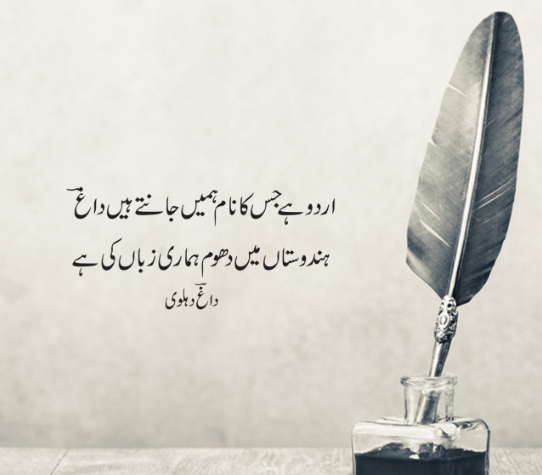By Syed Khalid Husain,
Singapore
Urdu, or more precisely Modern Standard Urdu, is one of the living, most popular, beautiful and sweet languages of the world. This language is spoken and understood in many countries including India, Pakistan, Bangladesh, Myanmar, Nepal, Sri Lanka and Afghanistan. Millions of South Asian immigrants and professionals in America, Canada, Europe, Middle East, Africa, Oceania and Southeast Asia speak, write, read and understand Urdu.
According to 2022 estimates of the CIA’s Ethnologue and The World Factbook, Urdu is the 10th most spoken language in the world. It has more than 230 million speakers, including those who use it as a second language. In India, Urdu’s status and cultural heritage are recognised in the Constitution and the language also has official status in many states. In Pakistan, Urdu is the lingua franca (contact language) and an official language along with English. In South Africa, Urdu has the status of a protected language in the constitution.
The origin of the word “Urdu” is from the Turkish word “ordu” meaning army, which gave the English the word “horde” meaning herd. The earliest form of Urdu was Braj Bhasha. A 1,000-year-old Indo-European language, Urdu was prevalent in northern India, especially Agra, Mathura, Jaipur and Delhi, during the time of Muslim warrior Mahmud Ghaznavi. About 500 years later, Urdu developed as the lingua franca of the Indian subcontinent under the influence of Arabic, Persian, Hindi and Turkish during the Mughal Era (1526 to 1857 CE). In united India, Urdu originated in Deccan (south) during the reign of the Nizam of Hyderabad but flourished in Delhi and Lucknow in the north.
Difference between Urdu and Hindi
Urdu and Hindi share common Sanskrit and Prakrit-derived vocabulary, phonetics, syntax and rules, making the two mutually intelligible in common speech. In addition, literary, political and technical words in formal Urdu are mostly derived from Persian, while in formal Hindi these elements are borrowed from Sanskrit. Consequently, mutual intelligibility between the two languages decreases as formality increases. The scripts of Urdu and Hindi are also different. Besides, Urdu is written from right to left, while Hindi is written vice versa.
Some important benefits of learning Urdu
- Learning Urdu gives you the opportunity to benefit from the vast Islamic and other classical and modern literature available in Urdu.
- Various competitive and government job exams in India, such as IAS and IPS, may be written in Urdu.
- Urdu can help one enjoy and better understand the songs, lyrics and ghazals of the Indo-Pak subcontinent.
- Learning Urdu can help one recognise words in Arabic, Persian, Sindhi and the Southeast Asian language Jawi, as many Urdu words are common to these languages and all of them share the same script.
- Urdu speakers appreciate those who speak to them in their language.
Understand Islam better
- After Arabic and Persian, Urdu has the largest collection of Islamic literature.
- Translations, commentaries and interpretations of the Holy Quran, and books on the rules of Shariah, Hadith, Fiqh, Sufism, spirituality, history and metaphysics are also available in Urdu.
- Because of the relatively low-cost publishing system and the use of Urdu as a language of communication among Muslims in different parts of the world, books on Islam in Urdu are more numerous than in any other South Asian language.
- Many classic Islamic books that were in Arabic and Persian have been translated into Urdu.
Study classical literature
- Urdu has produced many famous poets and writers all over the world, including great poets in India such as Mir Taqi Mir, Mirza Ghalib, Dr Muhammad Iqbal and Mulla Wajhi; prose writers including Mir Amman Dehlavi, Munshi Premchand, Shibli Naumani and Altaf Hussain Hali; and singers such as Begum Akhtar, Suraiya, Lata Mangeshkar and Mohammad Rafi.
- The national anthem of India, “Sare Jahan Se Achchha Hindostan Hamara…”, was written by the Poet of the East, Dr Allama Mohammed Iqbal.
Urdu movies, dramas and songs
- By learning Urdu one can listen to Indian and Pakistani songs, lyrics and ghazals (romantic poems). One can also enjoy Pakistani and dubbed Turkish serials that are known for their high quality.
- The language used in Indian films is declared as Hindi, although most of the dialogues and songs in these films are actually in Urdu.
- Thanks to the Indian film industry, Urdu songs are loved by millions of people around the world. The Indian film industry has produced numerous Muslim and non-Muslim story, script and dialogue writers and lyricists who have highlighted the richness of Urdu through the medium of one of the largest film industries in the world.
- Many people around the world love Indian songs although few understand their meaning. However, there is a great interest in Urdu all over the world.
About 150 years ago, the then famous Indian Urdu poet Nawab Mirza Khan Dagh Dehlvi had rightly said:
اردو ہے جس کا نام ہمیں جانتے ہیں داغؔ
ہندوستاں میں دھوم ہماری زباں کی ہے۔
(We realise the importance of Urdu, O Daagh;
for our language is being celebrated all over India.)
[The writer is a Singapore-based senior journalist. He may be reached at skhusain@yahoo.com]




